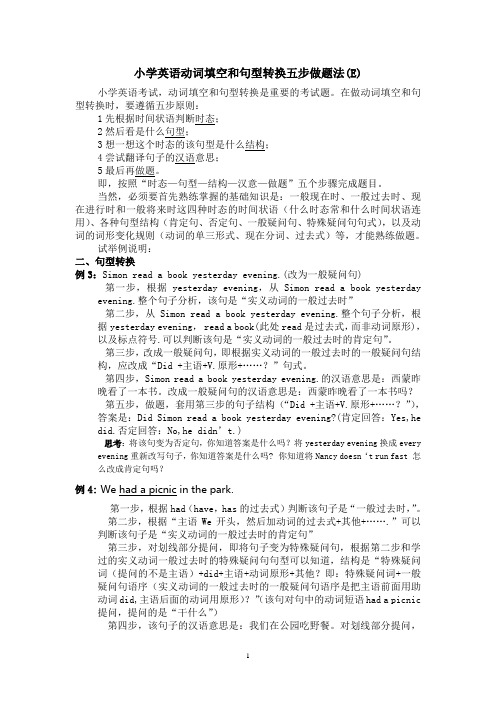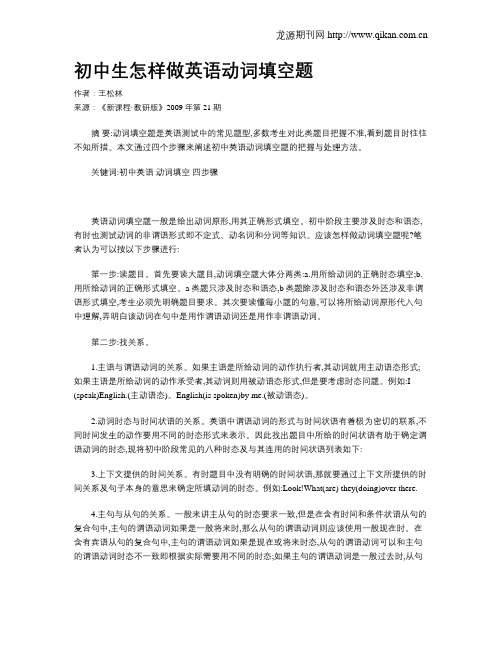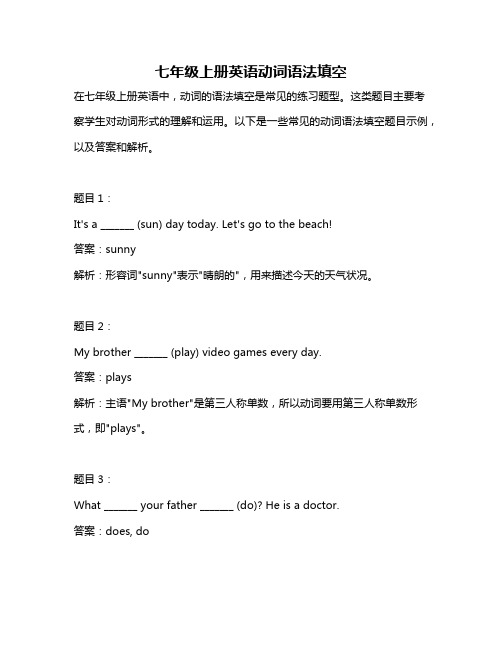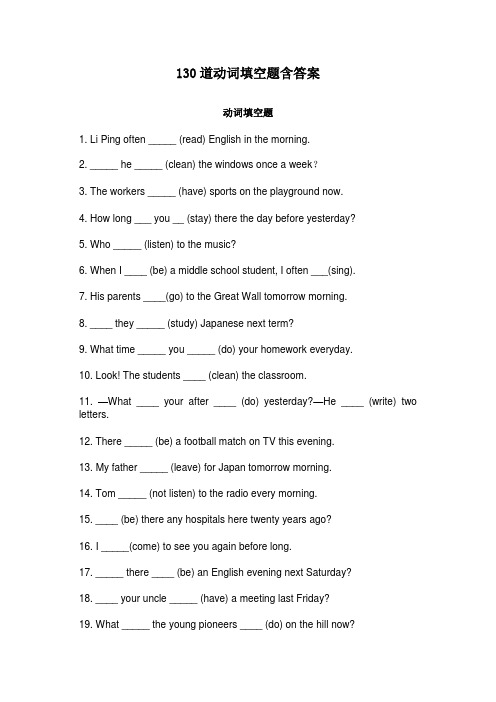巧做动词填空题
初中英语动词填空题的应试技巧

◎厦门市第十中学吴万江说,这篇短文中的动词填空是根据上下文结构和时间线来确定的。
正确的时态和语态选择有助于确保故事的连贯性和清晰度。
通过理解上下文中的关键词和副词,示过去某个时间点的动作;后一个句子的时态应与前句时态保持一致,因此应该填grabbed(抓住了)。
在这个句子中,由于突然失去了电力,所以需要立刻拿手电筒。
通过正确填写这三个动词,我们能够清晰地理解句子中不同时间点的动作顺序和关系。
这也是动词填空题的一种常见解答策略,即根据句子的上下文和语法规则来选择合适的动词形式。
总之,解答动词填空题时,首先要仔细阅读整个句子,理解句子的时态和动作的顺序;然后根据上下文线索和语法规则,选择合适的动词形式,确保动词与其他句子其他部分的逻辑保持一致;并通过反复练习和积累,提高动词填空题的应试技巧,更加准确地完成题目。
四、注意短语搭配,寻找答题思路在英语中,有许多常用的固定表达法,这些表达法中的动词形态通常是固定的。
例如,“make a decision”中的“make”不能替换为其他动词,因此需要记住这些固定搭配。
另外,部分短语动词通常有特定的意义,学生需要注意其正确用法。
短语动词是由动词和一个或多个副词或介词组成的,如“look forward to”“give up on”“run out of”等,学生应当将常用的短语背诵记忆下来。
除此之外,一些情态动词如“can”“must”“should”等在句子中有特殊的用法,了解这些情态动词的含义和用法有助于正确选择动词形式。
培养学生对常见动词短语的熟悉度,有助于学生在填空时辨别哪种短语搭配是正确的,提高做题效率和正确率。
例题:1.Jenny always homework before dinner.A.doesB.makesC.finishes2.Tom his keys at home this morning.A.forgotB.forgetC.forgets3.We should our friends when they are in trouble.A.helpsB.helpC.helped解析:第1题考查一个常见的动词短语搭配,“do homework”表示“做家庭作业”,又因为主语“Jenny”是第三人称单数,因此应当填“does”,意为“珍妮总是在晚饭前做家庭作业”,选择A。
小学英语动词填空和句型转换五步做题法(E)

小学英语动词填空和句型转换五步做题法(E)小学英语考试,动词填空和句型转换是重要的考试题。
在做动词填空和句型转换时,要遵循五步原则:1先根据时间状语判断时态;2然后看是什么句型;3想一想这个时态的该句型是什么结构;4尝试翻译句子的汉语意思;5最后再做题。
即,按照“时态—句型—结构—汉意—做题”五个步骤完成题目。
当然,必须要首先熟练掌握的基础知识是:一般现在时、一般过去时、现在进行时和一般将来时这四种时态的时间状语(什么时态常和什么时间状语连用)、各种句型结构(肯定句、否定句、一般疑问句、特殊疑问句句式),以及动词的词形变化规则(动词的单三形式、现在分词、过去式)等,才能熟练做题。
试举例说明:二、句型转换例3:Simon read a book yesterday evening.(改为一般疑问句)第一步,根据yesterday evening,从Simon read a book yesterday evening.整个句子分析,该句是“实义动词的一般过去时”第二步,从Simon read a book yesterday evening.整个句子分析,根据yesterday evening, read a book(此处read是过去式,而非动词原形),以及标点符号.可以判断该句是“实义动词的一般过去时的肯定句”。
第三步,改成一般疑问句,即根据实义动词的一般过去时的一般疑问句结构,应改成“Did +主语+V.原形+……?”句式。
第四步,Simon read a book yesterday evening.的汉语意思是:西蒙昨晚看了一本书。
改成一般疑问句的汉语意思是:西蒙昨晚看了一本书吗?第五步,做题,套用第三步的句子结构(“Did +主语+V.原形+……?”),答案是:Did Simon read a book yesterday evening?(肯定回答:Yes,he did.否定回答:No,he didn’t.)思考:将该句变为否定句,你知道答案是什么吗?将yesterday evening换成every evening重新改写句子,你知道答案是什么吗?你知道将Nancy doesn‘t run fast 怎么改成肯定句吗?例4: We had a picnic in the park.第一步,根据had(have,has的过去式)判断该句子是“一般过去时,”。
初中生怎样做英语动词填空题

初中生怎样做英语动词填空题作者:王松林来源:《新课程·教研版》2009年第21期摘要:动词填空题是英语测试中的常见题型,多数考生对此类题目把握不准,看到题目时往往不知所措。
本文通过四个步骤来阐述初中英语动词填空题的把握与处理方法。
关键词:初中英语动词填空四步骤英语动词填空题一般是给出动词原形,用其正确形式填空。
初中阶段主要涉及时态和语态,有时也测试动词的非谓语形式即不定式、动名词和分词等知识。
应该怎样做动词填空题呢?笔者认为可以按以下步骤进行:第一步:读题目。
首先要读大题目,动词填空题大体分两类:a.用所给动词的正确时态填空;b.用所给动词的正确形式填空。
a类题只涉及时态和语态,b类题除涉及时态和语态外还涉及非谓语形式填空,考生必须先明确题目要求。
其次要读懂每小题的句意,可以将所给动词原形代入句中理解,弄明白该动词在句中是用作谓语动词还是用作非谓语动词。
第二步:找关系。
1.主语与谓语动词的关系。
如果主语是所给动词的动作执行者,其动词就用主动语态形式;如果主语是所给动词的动作承受者,其动词则用被动语态形式,但是要考虑时态问题。
例如:I (speak)English.(主动语态)。
English(is spoken)by me.(被动语态)。
2.动词时态与时间状语的关系。
英语中谓语动词的形式与时间状语有着极为密切的联系,不同时间发生的动作要用不同的时态形式来表示。
因此找出题目中所给的时间状语有助于确定谓语动词的时态,现将初中阶段常见的八种时态及与其连用的时间状语列表如下:3.上下文提供的时间关系。
有时题目中没有明确的时间状语,那就要通过上下文所提供的时间关系及句子本身的意思来确定所填动词的时态。
例如:Look!What(are) they(doing)over there.4.主句与从句的关系。
一般来讲主从句的时态要求一致,但是在含有时间和条件状语从句的复合句中,主句的谓语动词如果是一般将来时,那么从句的谓语动词则应该使用一般现在时。
高考英语二轮复习语法填空之提示词为动词解题技巧课件(45张)

动词是历年高考的必考点,对动词有关知识的掌握是考生在语法填空中 得高分的关键。动词的变化形式比较多,有谓语形式的变化(如时态语态和 主谓一致及虚拟语气)、非谓语形式的变化(如不定式、动名词、现在分词 和过去分词)。
Content
如何确定作谓语和作何种谓语
如何确定作谓语和作何种谓语
典例印证
(2022·新高考Ⅰ卷)The GPNPis d5es_i_g_ned(design)to reflect the guiding principle of
“protecting the authenticity and integrity(完整性)of natural ecosystems, preserving biological diversity, protecting ecological buffer zones, 6 _and___ leaving behind precious natural assets(资产)for future generations”. 【分析】 第一步 确定填谓语。分析句子成分可知,空处缺谓语动词。 第二步 考虑时态语态和主谓一致。根据上下文可知用一般现在时,根据主语The GPNP与动词designe之间是被动关系,故用一般现在时的被动语态。
No.2 解题规则——再确定作何种谓语
技法一 提示词为动词时,确定时态的4根据
思维定向
典题试做
1. (2021·江西省九校联考)In the first century, many people in Roman Empire ____________ (work) underground in mines to
2.(2021·渭南市高三教学质量检测)At the edge of the Tibetan Plateau, Sichuan
七年级上册英语动词语法填空

七年级上册英语动词语法填空在七年级上册英语中,动词的语法填空是常见的练习题型。
这类题目主要考察学生对动词形式的理解和运用。
以下是一些常见的动词语法填空题目示例,以及答案和解析。
题目1:It's a _______ (sun) day today. Let's go to the beach!答案:sunny解析:形容词"sunny"表示"晴朗的",用来描述今天的天气状况。
题目2:My brother _______ (play) video games every day.答案:plays解析:主语"My brother"是第三人称单数,所以动词要用第三人称单数形式,即"plays"。
题目3:What _______ your father _______ (do)? He is a doctor.答案:does, do解析:特殊疑问词"what"引导的疑问句,需要用助动词"does"来构成疑问语气,同时动词要用原形,即"do"。
题目4:The little girl _______ (like) pandas very much.答案:likes解析:主语"The little girl"是第三人称单数,所以动词要用第三人称单数形式,即"likes"。
题目5:My family _______ (watch) TV at night.答案:watches解析:主语"My family"是第三人称复数,所以动词要用第三人称复数形式,即"watches"。
希望以上内容对您有帮助,如果您还有疑问,建议查阅教辅或询问老师。
130道动词填空题含答案

130道动词填空题含答案动词填空题1. Li Ping often _____ (read) English in the morning.2. _____ he _____ (clean) the windows once a week?3. The workers _____ (have) sports on the playground now.4. How long ___ you __ (stay) there the day before yesterday?5. Who _____ (listen) to the music?6. When I ____ (be) a middle school student, I often ___(sing).7. His parents ____(go) to the Great Wall tomorrow morning.8. ____ they _____ (study) Japanese next term?9. What time _____ you _____ (do) your homework everyday.10. Look! The students ____ (clean) the classroom.11. —What ____ your after ____ (do) yesterday?—He ____ (write) two letters.12. There _____ (be) a football match on TV this evening.13. My father _____ (leave) for Japan tomorrow morning.14. Tom _____ (not listen) to the radio every morning.15. ____ (be) there any hospitals here twenty years ago?16. I _____(come) to see you again before long.17. _____ there ____ (be) an English evening next Saturday?18. ____ your uncle _____ (have) a meeting last Friday?19. What _____ the young pioneers ____ (do) on the hill now?20. They __________ (not go) fishing on Sunday.21. How many classes _____ you _____(have) every day?22. It s seven in the evening, Tom s family _____ (watch) TV.23. He ___ (join) the army in 1985. He __ (be) still in the army now.24. I _____ (visit) my friend next Sunday.25. If it snows tomorrow, we _____ (play) with snow.26. I _____ (make) a lot of mistakes in my test yesterday.27. — _____ it __________ (snow) outside now? —No, it __________.28. Where ______ they ____ (live)? They ____ (live) in Shanghai.29. If it _____ (rain) this morning, we won t go shopping.30. Listen! Who _____(sing)in the next room?31. The teacher _____(not teach)us a Chinese song,he _____(teach)us an English song two days ago.32. If I am free this evening,I _(help)you with your maths.33. — ________you ________(be)there tomorrow? —No,I ________.34. Where _________(be)your parents last year? They ________(be)in Xi an.35. —Why _______ they _______(go)to the library after school yesterday? —Because they _________(want)to borrow some books.36. What _______ you _______(do)these days?37. Don t make a noise. Grandma _________(sleep).38. Sometimes he ____(help)his mother with the housework.39. Please write to us as soon as you _________(get)there.40. We ________(show)the foreign friends around Beijing when they get here.41. We ll wait till you _______(make)up your mind.42. They ______ just _______(talk)about you.43. —Where _____he ______(be)?—He _________(be)to the bank.44. —______ you______(visit)the Science Museum?—Yes,I________.45. —______she ______(tell)you the good news? —No,she _______.46. How long _______ your mother _______(teach)English in this school? ---For ten years.47. We _______ already _______(draw)five pictures.48. My grandson ______________(be)ill for a week.49. —________ the train _________(arrive)?—No,not yet.50. Our physics teacher ____(not come)to work today,because he is ill.51. My brother ________(make) many American friends since he went there two years ago.52. She _______(work) in a factory for three years before she went to college.53. Mr. Brown ___(live) in London for ten years by the end of last month.54. How many English words _________ you _________(learn) by the end of last term?55. ______ they _______(pick)all the apples before the farmer got there?56. I didn t return the book to the library,because I _______(not finish) reading it.57. The boy said that he ___________(not break)the window.58. Jack said that he ___________ (not go) over his lessons yet.59. John told me that he ____ (fly) to Japan next Wednesday.60. Did she say when she ___________ (be) back tomorrow?61. The head master said he ________ (meet) some foreigners at the station soon.62. I wondered if our team ___________ (win) this evening.63. He said he _______ (not make) the same mistakes again.64. We ____ (have) a meeting at that time.65. Tom ____ (not have) breakfast yesterday morning.66. Did he know he ____ (have) an English lest the next day?67. _____ your father _____ (go) to work by bike every day?68. Mr Wang _____ (teach) us maths since 1990.69. They will have a trip to the Great Wall if it ____ (not rain) next Sunday.70. When I got home my grandmother ________(make) cakes.71. I ______ (give) the note to him as soon as school is over.72. The English song _____ (teach) now over the radio.73. English _____ (speak) all over the world.74. The Great Green Wall must _____ (build) in the world.75. Can the report ____ (write) in English?76. The mountain will __ (cover) with the trees in a few years.77. The young trees must _____ (tie) to the stick to keep it straight.78. So far, many man-made satellites have ___ (send) up into space.79. English ___________ (speak) in Canada.80. Tennis ___________ (invent) a hundred years ago.81. It ___________ (snow) hard now. We d better ___________ (not go) home right now.82. These exercises must ___________ (do) by yourself.83. Our teacher told us time ___________ (be) life.84. We ____ (not see) each other since he ______ (leave) here.85. ___________you ever ___________(ride) a horse before?86. Miss Green ___________(be) in China for 6 years.87. We ___________ never ___________ (be) to Hawaii.88. You d better try to give up ___________ (smoke). It s too bad to your health.89. Who is doing well in ___________ (describe) things?90. Have you finished ___________ (read) the book?91. Have you saw someone ___________ (ski) before?92. —Can a shark stop ___________ (swim)?—No, It can t93. You d better try ___________ (do) it by yourself.94. The students kept ______(talk)about the football match.95. I had a computer lessons first. Then I went on ___________ (have) tennis lessons.96. He hopes ___________ (see) the famous football player as soon as possible.97. The boy kept ___________ (ask) strange questions to his teacher, it made the teacher unhappy.98. Edison enjoyed ___________ (try) his new ideas.99. He asked me ___________ (speak) loudly.100. Students must study hard __________ (make) our country strong. 101. The policeman made him ________ (stand) in the rain for half an hour. 102. Would you like something nice ___________ (eat)103. I can t decide which sweater ___________ (choose)104. He hasn t decided whether choose (tell) the truth.105. He told me where ___________ (buy) a computer.106. Will you please __________ (not talk) in the reading room.107. I have a lot of work ___________ (do).108. Why not ___________ (come) a little earlier?109. I m sorry ___________ (hear) that.110. When did you finish ___________ (pack) ?111. ___________ (talk) with her is a great pleasure.112. English is not so easy ___________ (learn) well.113. When makes him ___________ (think) I am a scientist.114. I forgot ___________ (bring) my textbook with me.115. Last night I heard Mike ___________ (cry) in the room.116. My idea is ___________ (have) a meeting at once.117. At night, the robot watched him _________ (sleep). It knew everything about Mr. Mott.118. In the country, he can hear birds ______ (sing) and sheep ______ (bleat)119. My job is ___________ (feed) the animals.120. In about 600 years, we will hardly have enough space__ (stand) in on the earth.121.Foresthelp to keep water from ___________ (run) away.122. He printer is used for ___________ (print) documents.123. He is busy ___________ (write) his composition.124. The film is worth ___________ (see).125. They prefer to ___________(stay) at home rather than ___________ (play) basketball.126. Your opinion is worth ___________ (consider).127. Ed starts _______ (carry) the bag, but trips over his shoes.128. We are going to have lots of fun _______ (hike) and _____ (eat) a new kind fruit.129. Are you good at ___________ (read) maps?130. Mary heard her father ___________ (say) he would set off the next week答案1. reads 2. Does, clean 3. are having4. did, stay5. is listening6. was, sang7. will go 8. Will, study9. do, do 10. are cleaning11. did, do, wrote 12. will be13. is leaving 14. doesn t listen15. Were 16. will come / is coming17. Will, be 18. Did, have19. are, doing 20. don t go 21. do, have 22. are watching 23. joined, is24. will visit 25. will play 26. made27. Is, snowing 28. do, live, live 29. rains 30. is singing 31. hasn t taught 32. will help 33. Will, be 34. were, were 35. did, go 36. are, doing 37. is sleeping 38. helps 39. get 40. will show 41. make42. have talked 43. has, been44. Have, visited, have 45. Has, told, hasn t 46. have, drawn 48. has been49. Has, arrived 50. hasn t come51. has made 52. had worked53. had lived 54. had, learned55. Had picked56. hadn t finished57. hadn t 58. hadn t gone 59. would fly 60. would be 61. would meet62. would win 63. wouldn t make64. were having 65. didn t have66. would have 67. Does, go68. has taught 69. doesn t rain70. was making 71. will give72. will give 73. is spoken74. be built 75. be written76. be covered 77. be tied78. been sent 79. is spoken80. was invented 81. is snowing, not go82. be done 83. is84. haven t seen, left 85. Have, ridden 86. has been87. have, been 88. smoking89. describing 90. reading 91. ski 92. swimming 93. to do 94. talking95. to have 96. to see 97. asking98. trying 99. to speak 100. to make 101. stand 102 to eat 103. to choose 104. to tell 105. to buy 106. not talk 107. to do 108. come 109. to hear110. packing 111. Talking 112. to learn 113. think 114. to bring 115. cry 116. to have 117. sleep 118. singing 119. to feed 120. to stand 121. running 122. printing 123. writing 124. seeing125. stay, play 126. considering 127. to carry 128. hiking, eating 129. reading 130. saying。
高考英语语法填空解题技巧
高考英语语法填空解题技巧高中英语语法填空题该怎么做?首先肯定是把基础打扎实,然后多加练习,最后掌握一些技巧,小编整理了相关资料,希望能帮助到您。
1用括号里的单词的正确形式填空:如果括号里的单词是动词,则看句子的主语是人还是物。
若主语是人,则通常用现在分词(即用动词的ing形式);若主语是物,则通常用过去分词(常考不规则动词的过去分词)。
但如果括号里的单词是表示人心情状态的动词,若主语是人,则在这个词后面加ed;若主语是物,则在这个词后面加ing。
如:1. Some owners will leave their animals outside for a long period oftime, (37)_______(think) that all animals are used to living outdoors.解析:句子不缺谓语(即动词),且owners(主人)与think(认为)是主动关系,故用动词的现在分词thinking表主动,答案为:thinking。
2. If (42) ______(leave) alone outside, dogs and cats can be very smart in their search for warm shelter.解析:If从句省略了主语(当主从句两个句子主语相同时,常省略从句主语),补充完整为:If dogs and cats are left alone outside 狗和猫是被主人留在室外,故用被动语态 be + 动词的过去分词。
但英语中为了避免重复啰嗦,省去了dogs and cats,此时直接用动词leave的过去分词left表dogs and cats与leave是被动关系,答案为:left。
3. Whether this story is true or not, it certainly is (45)_________(interest).解析:it代指this story(主语是物),应用interesting(令人感兴趣的),interested感兴趣的,应是某人对某物/人感兴趣。
中考英语“动词填空”题的解题思路与技巧
中考 英语“ 动词填 题 的解题思路与技巧
- _
"
■ 邵 立粉
“ 词 填 空 ” 是英 语 测 试 中 的 一 动 题
定时态 。 时态与时 间状语一般遵循 以下 几条原则 , 常见的时间状语 , 如: 例 a句 中若有 :vr a ,vr F dy ) ee dyeey r a y i
动词 的短语 动词 ( t epae, ek 如 a l b a k c r
f te l e出a. ah r k i t
2. u t e s i 1. u d b t Yo r moh r i l Yo ’ e—
t er
— —
ot ) u 等 没有被动语态 。例如 :
答 案 :ae enbi hv e u t b l
( ekt yu s a) or p o
似的时间状语( 或从句) , 时 句子( 主句) 或
多用一般将来时。例如 :
I i d s t an tmo r w, e f t o n’ r i e o ro w
— —
注 意: 不及物动词或相 当于不及物
T ee e i g V i t v n n . nh B. i th w l wac l
状语从句的主从复合句 中。 如果主句谓
语 动 词 为 将 来 时态 或 “ 态 助动 词 情 f n a .1ls c .m y l t等 ) a u +动 词 原 形 +
… …
近年 来中考 的“ 动词 填空 ” 的测 题
子的主语是 谓语动词 动作 的执行者 用 主动语态 , 反之用被动语态。例如 :
M a y tl ui ng n alb l di s
高考英语语法填空做题技巧
高考英语语法填空做题技巧高考英语的学习依然至关重要,不仅靠知识的积累和运用,同时也需要学习的方法和做题的技巧,下面给大家分享一些关于高考英语语法填空做题技巧,希望对大家有所帮助。
高考英语语法填空做题技巧做题技巧一:考查动词时态,不给出明确时间状语:这种测试形式在高考单项填空题中非常有效的考查考生是否能灵活运用所学语法知识的能力,因此要指导考生学会认真分析上下文语境,从而能准确确定所要填的时态。
高考单项填空题考查动词时态时,往往题干句无具体明确的时间状语,考生需对上下文语境进行分析,才能搞清所要考查的句子时态。
做题技巧二:明辨固定搭配置换迷雾现象:解答这类题时,考生应认真细心观察句子结构,尤其是一些常用句型转换、常用短语或从句关联词的割裂现象,高考命题是常常采用这种方式使短语或固定搭配中的某个成分不在原来位置,从而使该短语或固定搭配难以辨认。
若考生对所学语言知识掌握得不好的话,在考试中是难以对这种现象做出正确的判断和抉择的。
因此,这类题也是考生常常丢分的题。
做题技巧三:明确省略成分,补全句子看清真面目试题命制时,为使语言生动,自然、简洁,所以常常采用这种省略形式。
解答这类题,首先要求考生弄懂句意,再根据所学语法知识将句子还原或补全,有助于考生快速地掌握句子的意思。
不过这类现象多为同源主语的省略。
做题技巧四:巧用结构分析句子,理顺还原本来面目有些语法填空题的句子结构较复杂,迷惑性大,稍有疏忽,必定会受到干扰项的干扰,这时就需要耐心和细心地分析句子,弄清结构,再对照选项进行甄别选出正确选项。
做题技巧五:语境背景要弄清,细心分析究根源有些语法填空题常常在语境中考查考生对语言结构和语言知识的考查,这类题型是近年来常考题。
这就要求考生要针对语境做细致的分析,以语境为切入点对测试题进行思考,分析,甄别和抉择。
英语语法填空口诀1、接不定式作宾语的动词三个希望两答应:hope,wish,want,agree,promise两个要求莫拒绝:demand,ask,refuse设法学会做决定:manage,learn,decide不要假装在选择:petend,choose2、句子种类口诀句子按用途分四大体,陈述疑问感叹和祈使。
完形填空中动词的解题技巧
解析:”房子配备„.的家具“,”遵守“城市法律。均为生 活常识习惯搭配
3.In April ,Elvis___1___ on You Tube a video of the house as it was being built, gaining six million __2_ in four days 1.A.Deleted B downloaded C posted D searched 2.A.Sights B views C shares D complaints 解析:根据常识可知解析:根据常识可知youtube是个网站,我 们可以post”发帖子“或”上传视频“,得到”观看量“。 (1.A 19.57%, B 19.57% C.39.13%,D.21.74% 2. A 19.57% B 21.74% C. 39.13% D. 19.57%) 4. After ___2___ the British flag at the Pole, they took a photograph of themselves before they started the 950-mile journey back. 2. A. growing B. putting C. planting D. laying 「解析」根据常识,南极地区冰雪覆盖,须费好大的劲将旗 插进极地,plant在这里的意思是“安插”“插牢”,故答案为 plant.
日常词汇讲解 step 1: 学生自己读音标,领读。---背诵单词 step 2: 讲解, 扩展词性 名词,动词,形容词,近义词,反义词 造句,语境 step4: 利用《创新设计》,划出带有该词汇的重点句子,让学生背诵句子。 step3: 练习 题型:1。____(vt.)递交,递送 _____(N.)编辑______vt.编辑 _______n, 版本
- 1、下载文档前请自行甄别文档内容的完整性,平台不提供额外的编辑、内容补充、找答案等附加服务。
- 2、"仅部分预览"的文档,不可在线预览部分如存在完整性等问题,可反馈申请退款(可完整预览的文档不适用该条件!)。
- 3、如文档侵犯您的权益,请联系客服反馈,我们会尽快为您处理(人工客服工作时间:9:00-18:30)。
巧做动词填空题
动词填空题是小学英语考试中难度较大的一种题型。
它是考查学生综合运用语言的能力,是一种要求高、难度大、区分度较高的一种题型。
其形式一般是给出动词原形,用其正确形式填空。
小学阶段主要涉及时态和语态,有时也测试动词的非谓语形式即不定式、动名词和分词等知识。
要做好这种题型,除了有扎实的基础知识功底外,还要注意解题的方法,现简单介绍几种具体的做法:
一、找准时间状语
要确定一个句子的形态,首先要看这个句子所用的时间状语。
一般说来,每一种时态所用的时间状语是较为固定的。
如现在进行时的时间状语为now、look、listen等。
一般现在时的时间状语为often、usually、always、sometimes和every引导的表频率的副词等。
一般过去时的时间状语为last time (week, year,night…), yesterday, yesterday morning (evening, afternoon)等。
再如现在完成时的时间状语为just、already、yet、ever、in/during、the past two years,for和since等引导的表一段时间的短语或句子等。
看到一定的时间状语就要确定相应的时态,然后用动词的正确形式进行填空。
如处理we_(go)to Beijing yesterday.时由 yesterday可判定这个空应填went.
二、联系上下文
首先要分析全文的时态一般过去时还是一般现在时或者更复杂的时态以及该空所在的句子的时态。
有些句子本身无时间状语或
时间状语不明确,这就需要通过上下文的时态或意思来确定其时态。
如解答I don’t want to go there, I_(be)there twice.这道题时,由上下文的意思可判定,后一句对前一句造成的影响,故后一句应用现在完成时,所以该空应填"have been"。
三、把握句子时态
这种现象多出现复合句中,在初中阶段的英语学习中,所涉及的复合句主要是时间和条件状语从句。
在由if、when、before等引导的条件、时间状语从句中,如果主句为一般将来时,或由情态动词引导的句子或祈使句,从句则用一般现在时表示将来。
如在解答I'll come here if it_(not rain) tomorrow这道题时,由于主句是将来时,可判定从句用一般现在时,故在横线上填"doesn’t rain"。
还有在宾语从句中,如果主句是一般现在时,从句根据需要选用任何时态;如果主句是一般过去时,从句要用过去的某种时态(指一般过去时,过去进行时,过去将来时,过去完成时);如果从句表达的是一个客观事实(现在,过去或将来都存在的事实),不管主句是何种时态,从句仍用一般现在时。
例如The physics teacher told us that light _________ (travel) much faster than sound. 从句表达的是一个客观事实,所以用一般现在时,其答案为“travels”。
另外表示位置转移的动词,如:come, go, fly, stay, leave, move, start, arrive等,常用一般现在时表示根据计划将要发生的动作。
四、熟记固定搭配
这些特殊动词的固定结构的主要表现为,有些动词后面固定要用
动词不动式,如在want, hope, wish, order(命令),would like, plan, decide, get, learn, try, need, agree, choose, begin, start,等后一般接to+动词原形作宾语。
如:I want to go to the park. 有些动词后面固定要用不带"to"的动词不定式,如make sb do sth。
还有些动词后面固定要用动词的"ing"形式等。
如在enjoy, hate, love, finish, practice, mind, stop, keep, begin, start, be busy 等后一般接动词的ing形式作宾语。
如:I was busy doing my homework, I didn’t finish doing it until eight o’clock in the evening.。
